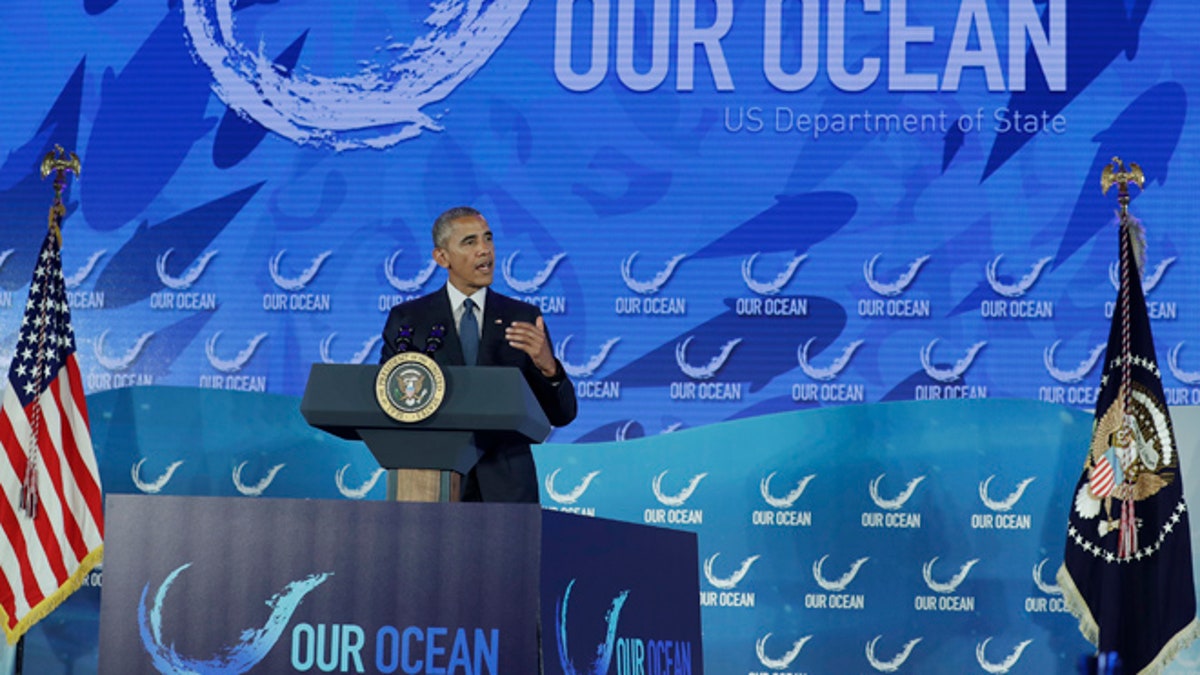
FILE - President Barack Obama speaks at the Our Ocean, One Future conference at the State Department in Washington, Thursday, Sept. 15, 2016. (AP Photo/Carolyn Kaster)
Who wants to save the oceans? Short answer: everyone, especially politicians. A less frequently asked question is whether their high-profile efforts always work.
Right now, world leaders seem to want to see who can declare the biggest marine protected areas, or MPAs, in their territory. MPAs are kinds of national parks for sea life that extends from ocean surface to ocean floor. Commercial fishing and other undersea ventures are banned in them.
They are popping up everywhere. In August, President Obama announced one in the western Pacific Ocean that is 50 per cent bigger than Texas. In September he created another, more modest one off the coast of New England.
Britain announced yet another MPA in September around St. Helena Island in the south Pacific. It is half the size of the Lone Star State.
In fact, the MPA movement has become a religion with accepted articles of faith that more and bigger are better. This current obsession is bad for the oceans, bad for the global environment, and bad for people.
Consider what the imposition of an MPA can do to the economy and livelihood of local fishers, who are unable to easily pick up and move elsewhere. Some fishermen in New England are warning that they could go out of business as a result of the new Atlantic marine preserve.
Large MPAs are also bad for people because reducing ocean fish production by itself will mean less high quality, nutritious food available for the poorest people in the world and less employment for fishing-dependent communities
Political leaders argue they are protecting the oceans with MPAs, but mostly they aren’t. The major threats to ocean health and biodiversity, including global warming, ocean acidification, oil spills, floating masses of plastics, pollutant run-off from land, and illegal fishing--all are not addressed by this conservation measure.
Ocean preserve advocates emphasize that about one-third of global fish stocks are overfished, and use that as a reason for ever-larger MPA designations. But there is also no evidence that MPAs actually increase the abundance of fish outside of the reserves, one of the chief motives proponents invoke to push for them.
MPA advocates like to use the analogy of a fish bank, and it works up to a point. Certainly, fishery abundance rises inside well-managed areas that are closed to commercial fishing.
But without other measures to address fishing effort, the same commercial boats that used to ply the newly protected waters can simply move across the boundary, increasing fishing pressure outside the MPA, although at increased cost. And fish don’t recognize MPA boundaries. They move beyond them.
In truth, some MPAs can provide biodiversity benefits and increases in fish harvests in places that lack more comprehensive fisheries management.
Unfortunately those are the same places where MPAs are also often difficult or impossible to enforce, due to the cost of surveillance and of any legal efforts to bring offenders to justice.
A bigger fact is that in U.S. waters, fish stocks are increasing, and overfishing is declining rapidly, without a significant number of MPAs.
Why? For one thing, we already have a myriad of well-enforced laws that protect fish stock health and marine biodiversity very well, through a science-based management system. They do it better than simply closing off large sections of the ocean.
Around the world we see fish stocks increasing in abundance when fisheries management is effectively applied, without MPAs playing a significant role. Fish stocks in the U.S., Iceland, Norway, New Zealand, South Africa and Australia have all been shown to rebuild from overfishing through traditional fisheries management -- we don’t need MPAs to rebuild fish stocks.
In reality, redirecting hundreds of millions of dollars spent on MPA advocacy towards other threats to the ocean, or to improving fisheries management globally, would provide much more comprehensive and proactive protection.
The MPA advocacy movement needs to embrace the reality that closing ever-larger areas of the ocean to fishing, when it happens, should be guided by clearly stated objectives, independent scientific evaluation of alternatives, and public consultation on the impacts on people.
MPAs should be established where the problems are, not where it is politically expedient. A race to see who has the biggest or the most is running in the wrong direction.







































